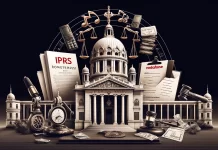The Copyright Office vide its public notice dated November 27, 2020 has invited for objections/ comments, if any from public/ stakeholders, in respect of application filed by Screenwriters Rights Association of India (SRAI) for registration as a copyright society under Section 33 of the Copyright Act in literary and dramatic works such as story, script, screenplay, dialogues or any other literary works (excluding lyrics).
Read the public notice and application here.
The SRAI had earlier in 2017 filed an application for registration as a copyright society for which copyright office had issued a public notice and invited suggestions. It is not known as to what was the reason for the delay in the Government not processing their request or asking them to submit a fresh application.
The members of the SRAI include writers such as Saket Chaudhary, Javed Akhtar, Anjum Rajabali, Rajesh Dubey, Juhi Chaturvedi and producers such as Vipul Shah, Mohammed Baduiuzzaman, Kamlesh Pandey.
What does the application seek?
The applicant proposes to carry on the business of issuing and granting licenses/assignments, and otherwise administering, on an exclusive basis, on behalf of authors and owners of copyright in literary and dramatic works, such as the story, script, screenplay, dialogues and other literary works (excluding lyrics).
(i) the mechanical reproduction right with respect to such story, script, screenplay, dialogues and other literary works (excluding lyrics) in which copyright subsists and is incorporated including by way of an adaptation in any audio, visual or audio-visual works.
(ii) the right to communicate to the public, by way of public performance, radio and tele vision broadcast, internet streaming, etc., of any story, script , screenplay, dialogues, or any other literary works (excluding lyrics) and dramatic works in which copyright subsists, and which is incorporated, including by way of an adaptation, in any audio, visual or audio visual works; (iii) the right to make an adaptation or translation of the story, script, screenplay, dialogues and other literary works (excluding lyrics) and dramatic works in which copyright subsists;
(iv) the right to synchronize the dialogues, or any other literary works (excluding lyrics) and dramatic works in which copyright subsists, with any visuals.
This includes the right to collect consideration/ royalties for the exploitation of the above rights and to pursue all remedies for the protection of such rights, including to institute legal proceedings against third parties in the applicant’s own name, to enforce the abovementioned rights in case of infringement.
What does this mean for the industry?
The last few months have seen some drastic policy level movements from the Government indicating that a change is bound to come sooner or later such as:
- Stakeholder meetings on issues like whether there is a need to have a single or multiple copyright society for same class of works
- inviting stakeholder comments on the need for amendment to Copyright Act
- Issuing a draft amendment to Copyright Rules in 2019
The Copyright Amendment of 2012 which has been in force for over eight years has evidently not seen the light of implementation due to its interpretational flaws. Instead of clearly setting out a mechanism in how, when by whom royalties would be payable, the ambiguous language of certain provisions introduced by the Amendment only leave more scope for interpretation resulting in no royalties having been paid barring those to few societies like IPRS.
If SRAI is granted registration status as a copyright society, it would result in its writer members receiving royalties when their works are utilized.
Foreseeable issues?
Negotiations of agreements in film industry are all voluntary and commercially driven negotiations. In most cases, producers retain all rights in a film and its underlying works to be able to exploit the same in the most commercially effective manner to recoup their investments and make profits.
For instance, there could be isolated deals or slate deals assigning all negative rights in the films a producer holds which may include derivative rights such as prequel, sequel, remake and other adaptation right.
While SRAI’s registration as a copyright society, if achieved, will definitely help in the writers collecting royalties, it would be an uphill task to see the implementation where all rights in the film are owned by producers. This registration is bound to change the dynamics of the way the audio visual industry currently works in India.
Image source: here


















